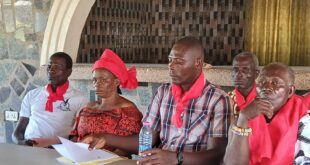US-based Ghanaian, Fred Asante, who was arrested on February 17, 2021, as a member of a criminal money laundering syndicate in Ghana, has now pleaded guilty.
Fred Asante pleaded guilty to one count of conspiracy to commit money laundering, which carries a maximum sentence of 20 years in prison and is expected to be sentenced on May 18, 2022.
In a statement shared by the US Attorney’s Office for the Southern District of New York, the state attorney, Damian Williams, announced that Fred Asante was part of a criminal gang in Ghana called the “Enterprise” which was involved in the theft of tens of millions of dollars.
“Fred Asante admitted today to laundering money from victims of various fraud schemes, including cruel scams targeting elderly online daters searching for companionship.
“Compounding the disappointment of learning their potential soulmate was indeed non-existent, Mr Asante’s victims later found they were also targets of a Ghana-based criminal enterprise netting over $35 million in illegal proceeds,” www.justice.gov has reported.
The state attorney urged Americans “looking for someone special online” to be very cautious.
Meanwhile, his co-conspirator, Lord Anning, who pleaded guilty to conspiracy to commit wire fraud on October 15, 2021, will be sentenced on February 28, 2022.
Also, the statement indicated that Asante and members of the “Enterprise” have committed frauds against individuals and businesses United States (US), including in the Southern District of New York.
“The frauds perpetrated by the Enterprise have consisted of, among other frauds, business email compromises, romance scams, and fraud schemes related to the novel coronavirus/COVID-19 pandemic,” the statement said.
It added that the “Enterprise” defrauded Americans by impersonating businesses and individuals through emails and also by conducting romance scams by using electronic messages sent via email, text messaging, or online dating websites.
How US busted Ghana’s $50m ‘sakawa’ empire run by 6 men
The operation was led by New York FBI and IRS, CI agents
Investigative authorities in the United States this week announced the arrest of six Ghanaians suspected to be involved in a cyber-fraud operation that saw them rip off victims to the tune of $50 million.
According to the US Attorney’s Office for the Southern District of New York, the defendants were arrested across a number of states at different times.
The identities of the suspects were given as follows: Farouk Appiedu, Fred Asante, Celvin Freeman, Lord Aning, Sadick Edusei Kissi, and Faisal Ali.
The operation that led to their arrest spanned between 2013 and 2020 during which period the group committed a series of business email compromises and romance scams against individuals and businesses located across the United States.
The frauds perpetrated by the Enterprise have consisted of, among other frauds, business email compromises, romance scams, and fraud schemes related to the novel coronavirus/COVID-19 pandemic, an official statement said in part.
Collectively over the period of their operations, four of the six suspects, Appiedu, Asante, Freeman, and Aning; were said to have controlled more than 45 bank accounts that had deposits that totalled over approximately $55 million.
The operation was undertaken by the New York Offices of the Federal Bureau of Investigations, FBI, and the Internal Revenue Service, Criminal Investigations (IRS, CI). Prosecution of the case is being handled by the Office’s Complex Frauds and Cybercrime Unit.
Three-step modus operandi
First, the objective of the Enterprise’s business email compromise fraud scheme was to trick and deceive businesses into wiring funds into accounts controlled by the Enterprise through the use of email accounts that “spoofed” or impersonated employees of a victim company or third parties engaged in business with a victim company.
Second, the Enterprise conducted the romance scams by using electronic messages sent via email, text messaging, or online dating websites that deluded victims, many of whom were vulnerable older men and women who lived alone, into believing the victim was in a romantic relationship with a fake identity assumed by members of the Enterprise.
Once members of the Enterprise had gained the trust of the victims using the fake identity, they used false pretenses to cause the victims to wire money to bank accounts the victims believed were controlled by their romantic interests, when in fact the bank accounts were controlled by members of the Enterprise.
Finally, the Enterprise submitted fraudulent loan applications through a loan program of the United States Small Business Administration (the “SBA”) designed to provide relief to small businesses during the COVID-19 pandemic, namely the Economic Injury Disaster Loan (“EIDL”) Program.
The Enterprise submitted fraudulent EIDL applications in the names of actual companies to the SBA and when an EIDL loan was approved, the funds were ultimately deposited in bank accounts controlled by members of the Enterprise, including certain of the defendants.
Details of retrieved vehicles

As part of the investigation of one of the accused, Farouk Appiedu, the US government further announced the seizure and is seeking the forfeiture of four luxury cars purchased, at least in part, with fraud proceeds.
The seized automobiles include two 2019 Rolls Royce Cullinans, a 2020 Bentley Continental GT, and one 2020 Mercedes-Benz G63 AMG.


How the arrests were made
Freeman and Ali were arrested on February 17 in New Jersey and have since appeared before a Manhattan federal court.
Asante and Aning were arrested also arrested same day but in Virginia, authorities said they had been arraigned before the United States District Court for the Eastern District of Virginia in Alexandria, Virginia.
Appiedu’s arrest was as far back as October 18, 2020 in Queens, New York. Kissi on the other hand was previously arrested in Fargo, North Dakota on February 5, 2020.
What US investigators have said
Manhattan U.S. Attorney Audrey Strauss said: “The fraud schemes alleged that these defendants facilitated were lucrative, diverse, and most of all, callous. As alleged, they engaged in email spoofing, duping elderly online daters into wiring them money, and applying for government-funded Coronavirus relief funds earmarked for the benefit of small businesses affected by the pandemic.
Thanks to the determination of the IRS and FBI, these defendants face serious prison time, and their next online profiles could potentially appear in a place where they’ll be unable to catfish anymore – the website for the Bureau of Prisons.
FBI Assistant Director-in-Charge William F. Sweeney, Jr. said: “The scams we allege in this investigation include romance scams targeting the elderly, business e-mail compromise scams, and even fraudulent covid-19 relief loans. In many of these and similar fraud cases, victims are reluctant to come forward because they fear embarrassment or reputational damage.
Some may even believe the perpetrators are beyond our reach because they often live abroad. These arrests and indictments should serve as a reminder that the FBI and our law enforcement partners are here to help you and bring these bands of criminals to justice.”
IRS-CI Special Agent in Charge Jonathan D. Larsen said: “The arrests of the alleged ringleaders of this more than $50 million scheme today dealt a death blow to the vast criminal activity in which the defendants were engaged, including elderly scams, COVID-19 fraud, money laundering, among others.
IRS Criminal Investigation will continue to aggressively pursue those who profit from illegal activity and ensure they are brought to justice.”
Source: www.ghanaweb.com
 Home Of Ghana News Ghana News, Entertainment And More
Home Of Ghana News Ghana News, Entertainment And More





